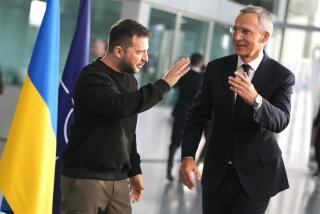U.S., Kremlin Urged to Unite in Terror Fight
- Share via
MOSCOW — U.S. and Soviet terrorism experts urged Friday that the superpowers set up a joint group to promote cooperation in combatting international terrorism and that they help each other at the diplomatic, intelligence and technical levels.
Completing their first bilateral talks with a comprehensive plan for concerted action, the group of 10 Soviets and 10 Americans also recommended a prohibition on the sale or transfer of military explosives and certain classes of weapons to non-governmental organizations as well as restrictions or tighter control on sales to other nations.
Curbing such sales has long been of concern to the United States because many of the weapons used by terrorist groups come from East Bloc countries.
The Soviet and American specialists also called for joint efforts to prevent terrorists from acquiring chemical, biological, nuclear and other weapons of mass destruction and for joint exercises to improve cooperation during terrorist incidents.
Nuclear terrorism, either in acquisition of nuclear capabilities or attacking nuclear facilities, has long been an important issue for the Soviets, while the United States has been concerned about the proliferation of chemical and biological weapons capabilities by Third World countries, notably Libya.
The group suggested the “exchange of technology that may be useful in preventing or combatting terrorism . . . consistent with the national security interests as defined by each nation.”
The proposals, in a nine-point statement climaxing a five-day conference here, are the most far-reaching ever advanced on Soviet-American cooperation to combat terrorism. They particularly reflect the growing concern in Moscow about the international threats--and thus the greater interest in joint efforts.
Although the conference was organized by private Soviet citizens, current and former government officials spoke at the session. And the conference in general was officially sanctioned “at the highest levels,” according to Soviet organizers.
Before it was held, both the U.S. and Soviet governments privately expressed interest in its outcome as an indication of the potential for official talks.
Although both sides deliberated at length over the wording of the statement, the Soviets allowed the Americans to take the lead on every issue--a further indication of the Soviet Union’s new interest in cooperation.
‘A Real Breakthrough’
“This is a real breakthrough,” said John Marks, chairman of the private U.S. foundation Search for Common Ground, which organized the meeting on the American side.
“A very important basis of cooperation has been set. We now see a possibility of how the U.S. and the Soviet Union could work together. The framework is now established as are the specifics. It’s now up to the two governments to move.”
In a broad statement, the Soviet-American group said, “In their bilateral relations as well as their respective relations with all other states, the U.S. and the Soviet Union should recognize their strong mutual interest in preventing acts of violence, especially acts of terrorism, which could have catalytic regional consequences, and thereby lead to their involvement in local conflicts against their interests.
“Therefore, the U.S. and the Soviet Union should move together to prevent terrorism and control its consequences when it occurs. The issue of international terrorism--its causes, manifestations and consequences--should be high on their bilateral agenda.”
The wording was aimed particularly at stressing the importance of preventing terrorist incidents that might in turn derail superpower relations.
Ties to Client States
Both the United States and the Soviet Union have strong relations with client states, particularly in the Middle East, that the other side has accused of terrorist activity. Both sides expressed the greatest interest in establishing a formal link at the level of operations and crisis management, to prevent terrorism and resolve or investigate attacks.
The group also proposed bilateral talks on requiring chemical or other “tags” on commercial and military explosives to aid investigators of terrorist bombings.
That issue is particularly sensitive to the United States, which has been the target of a series of bombings over the past six years, including the explosion aboard Pan Am’s Flight 103 over Scotland last month. U.S. investigators have still not fully resolved several of the earlier incidents.
On legal issues, the two delegations recommended “drafting an international convention that would cover threats and acts of violence that deliberately target the civilian population and that have an international dimension.”
They also proposed consideration of the feasibility of an international tribunal, either ad-hoc or permanent, to try individuals responsible for international terrorism. In addition, they called on the United Nations to establish a standing committee on international terrorism.
Although the two sides acknowledged that there were inherent limitations to cooperation, often related to the status of superpower relations, the general tenor of the meeting was considered by both sides to be a big step forward on one of the most controversial and sensitive issues dividing the two nations.
Interest in the outcome has been so high here that the Soviet press has been leaking reports of the closed sessions all week. In one reflection of the interest, a leading political commentator of the Soviet news agency Tass echoed Marks’ comments by heralding the conclusion as the beginning of a new era in peace.
FIGHTING TERRORISM
U.S. and Soviet experts urged these and other steps to fight terrorism:
Restraints on sale of military explosives and certain weapons to non-military groups.
Joint efforts to prevent terrorists from acquiring chemical, biological and nuclear weapons.
Joint efforts to improve cooperation during terrorist incidents.
Bilateral talks on requiring chemical or other “tags” on commercial and military explosives to aid inquiries into terrorist bombings.
Drafting an international convention that would cover threats and acts of violence against civilians.
An international tribunal to try people responsible for international terrorism.
Establishment of a U.N. standing committee on international terrorism.
More to Read
Sign up for Essential California
The most important California stories and recommendations in your inbox every morning.
You may occasionally receive promotional content from the Los Angeles Times.










